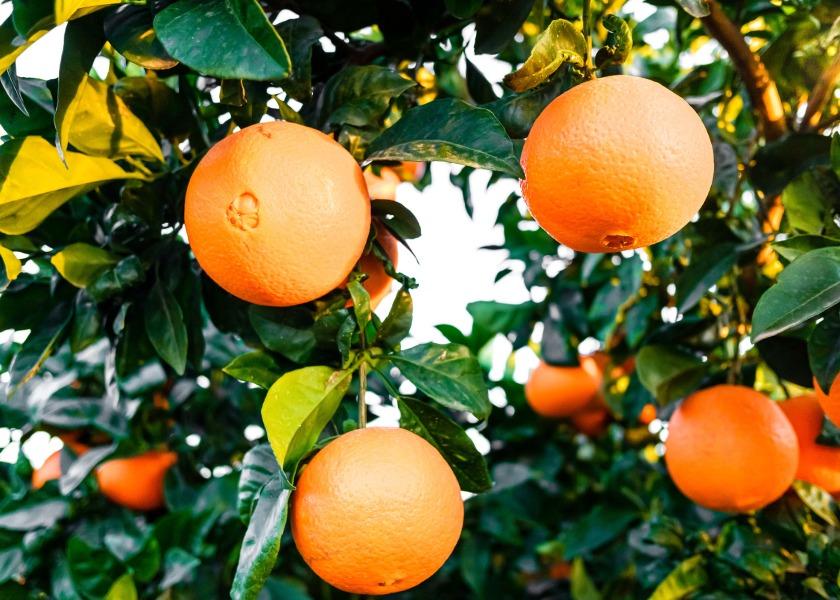Organic research to combat citrus greening gets $2M in USDA funds

Since the first detection in Florida in 2005, huanglongbing, also known as HLB or citrus greening disease, has forever altered the citrus industry. Efforts to slow the spread and treat infected trees have been met with mixed results and continue to challenge citrus growers.
Meanwhile, the organic citrus industry continues to enjoy steady growth. A $90 million industry, sales grew by double digits in 2021, according to The Organic Center. The combined effect of decreased supply and increased demand has resulted in soaring organic citrus prices in the grocery aisle.
In Nov. 2021, looking for effective strategies to better control the disease, the USDA issued emergency funding to research possible solutions. The USDA’s National Institute for Food and Agriculture invested nearly $11 million in emergency funding research how to better combat HLB in the three major U.S. citrus growing regions – Florida, California and Texas. These research funds cover a wide range of approaches to stop and slow the spread of HLB, such as studying possible solutions to slow transmission inside the insect host all the way to treating HLB-infected trees.
A year later, research expands to include organic. On Nov. 18, 2022, the USDA’s flagship organic research program, Organic Agriculture and Research Extension Initiative, awarded over $2 million in funding to a team of scientists from the University of Florida, Texas A&M University and The Organic Center.
The team of researchers will focus on a 4-year project to provide organic citrus growers critical tools to reduce and manage the spread of citrus greening in their groves, with hopes that findings will have broad application for both conventional and organic growers.
“The studies will provide tools to manage the spread of HLB and the insect that spreads the disease on organic farms and to integrate into the conventional and area-wide management programs,” said Dr. Quereshi, associate professor of entomology at University of Florida and lead researcher on the project. “This will help reduce the spread and severity of the HLB in the regions where this disease is present.”
Organic strategies could help all growers
Non-profit educational and research organization, The Organic Center, received a sub-award of $114,630 to conduct national outreach and education efforts related to the 4-year research grant. The Packer met with The Organic Center’s Director of Science Programs, Dr. Amber Sciligo, to learn more about what this grant award means for organic citrus research.

“It would be great if we could produce the knowledge that’s needed to give farmers more tools to fight citrus greening in the organic industry,” Sciligo told The Packer. “Beyond that, I’m hoping we can come up with organic strategies, or even less chemical-focused strategies, for all citrus growers.”
Since 2005, the battle to loosen the grip of HLB has, largely, not been successful. Sciligo hopes that funding organic research to the study system-based approaches to combat citrus greening will contribute to larger industry goals to curb the toll the disease has taken on citrus groves throughout the U.S.
Related news: Global fight rages against HLB
In conversations with grower groups, Sciligo said that farmers have attested that tools that were once working are no longer as effective. While conventional farmers might not be as knowledgeable about whole system approaches or ecosystem functions, like organic farmers, she said, both organic and conventional growers are looking for solutions that will work.
Specific organic methods and practices that the team of University of Florida and Texas A&M researchers will investigate include a wide range of organic strategies.
“I'm excited that this group is going to be able to combine methods like using plastic mulch and natural predation of the pest that transmits the disease using biological sprays. We’re also going to check out the possibility of incorporating netting,” said Sciligo. “There will be some evaluation of a systems approach, which is exciting. [The project group is] including farmers and doing surveys to really make sure that what they're doing is applicable and relevant. And they're even taking it a step further to analyze these approaches economically.
“Because it's all well and good if we can come up with a magic formula, but if it's not something that farmers can implement, logistically or monetarily, then it's never gonna go anywhere,” added Sciligo.
Expanding citrus greening research to organic
The $2 million-plus grant awarded to organic research marks a clear break from previous grants from NIFA’s emergency funding, which did not include research into organic systems.
“This is exciting, because that means a quarter of the funding is going to organic research right now,” said Sciligo. “In the past, organic has not been a part of this funding.”
“I’m heartened by some of the grants coming up,” Sciligo added. “Sometimes you just need that initial investment for people to feel like it's worthwhile to also invest.”
In past funding rounds, Sciligo says the research has been siloed into either citrus greening or organic agriculture with no overlap. This separation of research has caused barriers to funding research for organic solutions to citrus greening.
“Organic farmers try to tap into funding for citrus greening, and they say ‘no, organic has its own funding,’” said Sciligo. “But then the same farmers go to get organic funding and organic [funders] are like ‘no citrus greening has its own kind of funding.’ So, this grant is finally marrying these two worlds and it’d be great if they could stay married.”







